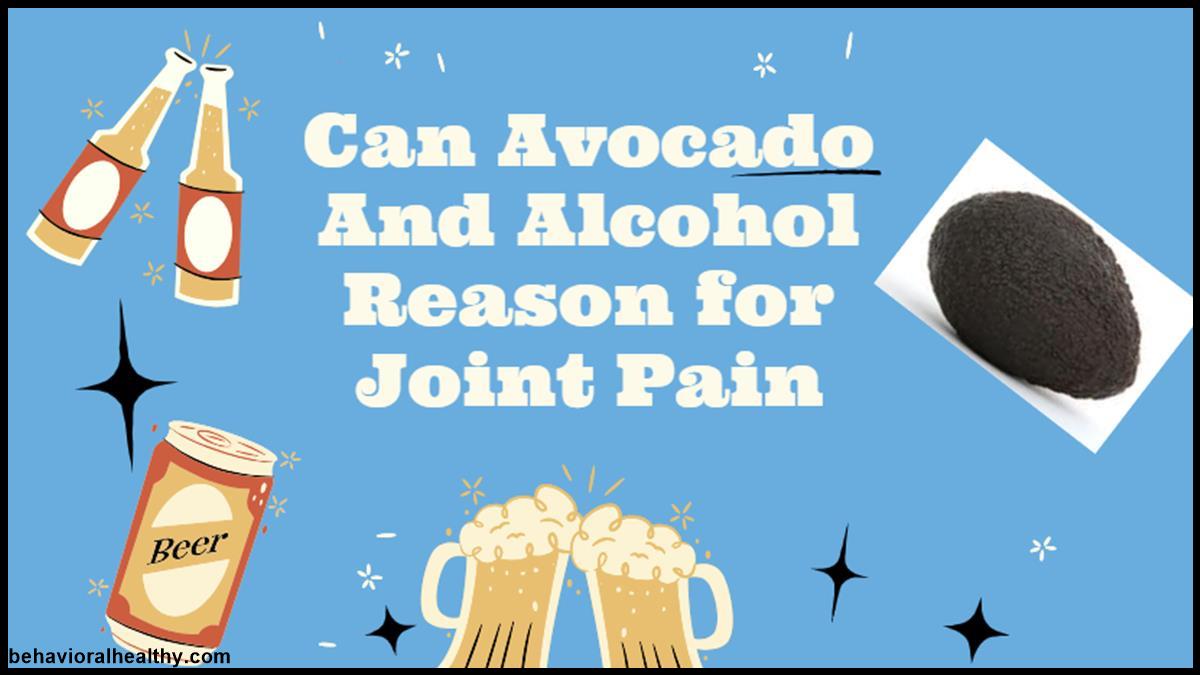When considering avocado and alcohol joint pain, it’s important to note that while avocados support joint health.
Table of Contents
Avocado and Alcohol: Can They Affect Joint Pain?
Joint pain is something that many people deal with as they get older. It can be caused by inflammation, arthritis, overuse, and other conditions. There’s a lot that what you eat and drink plays a role in how your joints feel. If you’re one of the many people living with joint pain, you might wonder if certain foods, like avocado, or drinks, like alcohol, could be contributing factors. You should understand the connection between avocado and alcohol joint pain. So it will help you make better dietary choices. In this article, we’ll explore how avocado and alcohol might impact joint pain.
Avocado: Friend of Joint Health?
Avocados are considered to be a "superfood" because of their numerous health benefits. Packed with healthy fats, vitamins, and antioxidants, avocados are especially touted for their anti-inflammatory benefits. They boast monounsaturated fats, which help fight inflammation in the body. That can be helpful for those who suffer from joint pain, especially someone with arthritic inflammatory conditions.
In addition, avocados contain a healthy dose of vitamins and minerals like vitamins E and K, potassium, and magnesium that promote bone integrity and joint mobility. When considering avocado and alcohol joint pain, it’s important to note that while avocados support joint health, alcohol can have the opposite effect by increasing inflammation.
How Avocado Supports Your Joint Pain
- Anti-inflammatory
The healthy fats in avocados fight inflammation that could lead to stiff joints and pain.
- Promotes cartilage health
Lutein and beta-sitosterol found in avocados can play a role in repairing damaged cartilage.
- Rich in antioxidants
They help protect the joints from oxidative stress that can lead to wear and tear on the joints over time.
For those suffering from stiff and inflamed joints, adding this vitamin and nutrient-rich smoothie to their diet for a few days may relieve some of that joint pain and inflammation.
Alcohol and Joint Pain: The Impact
Avocado may be good for joints, but alcohol has the opposite effect. Alcohol intake, especially in excessive quantities, has been shown to worsen pain and joint inflammation through several mechanisms.
- Alcohol as an Inflammatory Agent
Alcohol has been shown to contribute to inflammation in the body, especially in the joints. Research has shown that alcohol consumption increases the levels of pro-inflammatory cytokines, proteins that drive inflammation. This rise in inflammation can exacerbate diseases like rheumatoid arthritis, osteoarthritis, and gout.
- Gout and Alcohol
For individuals with gout arthritis due to uric acid accumulation in joints, alcohol can exacerbate the condition. All alcoholic beverages, like beer, wine, and liquor, raise uric acid levels in the blood, which can cause painful attacks of gout in the joints, especially the big toe.
- Dehydration and Joint Pain
Alcohol is a diuretic, which is to say that it makes the body expel water. When the body runs out of this fluid, the joint space helps to lubricate the joints, making them more susceptible to friction, discomfort, and worsening joint pain. Good hydration is important for joint health, and alcohol’s dehydrating effects can put the joints at greater risk.
- Alcohol’s Effects on Muscle Recovery
Alcohol can reduce the speed at which muscles recover and repair, a concern for anyone participating in physical activity or exercise. That’s because alcohol can slow down recovery time, which may leave people feeling achy for a longer time after intense workouts, as exercise takes a toll on the joints.
Avocado and Alcohol: Tips for Joint Pain Management
So, if you want to eat avocado and alcohol at the same time with very low joint pain, here are tips.
Reduce Alcohol Consumption: Your liver will thank you. So limit alcohol consumption both in terms of the number of days you consume and the quantity consumed to help keep inflammation under control and inflammation from interfering with joint health.
Hydrate Well: If you have a drink, make sure you drink plenty of water with it to reduce dehydration and lessen its effects on your joints.
Focus on Anti-Inflammatory Foods: Besides avocados, some other anti-inflammatory foods you should have in your diet are leafy greens, fatty fish (like salmon), nuts, seeds, and turmeric. Eating these foods can also help to relieve pain and inflammation in the joints.
Exercise Regularly: Moderate physical activity can help build up the muscles around your joints and ease pain. However, high-impact activities may exacerbate joint discomfort, so avoid them. Gentle activities, such as swimming or yoga, may be helpful.
Consult with a Doctor: If you already have chronic joint pain or a condition like arthritis, it’s a good idea to speak to a healthcare provider about how alcohol impacts your joints and if you should be steering clear of it entirely.
Wrapping It Up
The avocado is a fantastic ally of joint health with its anti-inflammatory properties, healthy fats, and vitamins that help reduce stress on the joints and cartilage and help have strong bones. However, alcohol does the opposite by increasing inflammation, dehydration, and the risk of joint pain conditions such as gout. When considering avocado and alcohol joint pain, it's important to note that balancing avocado intake with occasional alcohol consumption can still allow you to enjoy the benefits.
If you’re struggling with joint pain, a diet that emphasizes foods that may reduce inflammation, like avocado, and limits alcohol can help you keep your joints healthier and more comfortable.

